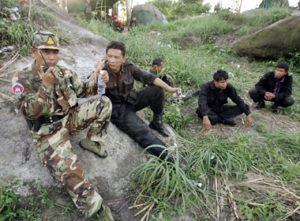 As news broke yesterday that a Cambodian solider was killed on the border with Thailand, the site of a border dispute that was just recently adjudicated by the International Court of Justice (ICJ), a brief but critical analysis is required in order to ascertain the significance of such a development. The Phnom Penh Post reported that Cambodia’s military officials asserted that Thai soldiers, on their side of the border, initiated the hostilities:
As news broke yesterday that a Cambodian solider was killed on the border with Thailand, the site of a border dispute that was just recently adjudicated by the International Court of Justice (ICJ), a brief but critical analysis is required in order to ascertain the significance of such a development. The Phnom Penh Post reported that Cambodia’s military officials asserted that Thai soldiers, on their side of the border, initiated the hostilities:
Pok Sophal, a Royal Cambodian Armed Forces commander for Oddar Meanchey’s Trapaing Prasat district, about 100 kilometers from the Preah Vihear temple, claimed that Thai soldiers had opened fire on the soldiers.
–
“We had an appointment for the meeting [between Cambodian and Thai soldiers], and when we were walking, they opened fire at our soldiers,” he said. “They were already prepared to intentionally open fire at us in advance.”
However, the article then goes on to say that the Cambodian government had a different account of what they believed to have transpired:
Phay Siphan, spokesman for the Council of Ministers, yesterday said government officials were still investigating the issue, but that reports of an armed clash were “not accurate”.
–
“Officially, [there was] no confrontation between Cambodian soldiers and Thai soldiers. The casualty that happened was not involved with an armed clash at all,” he said. “The situation on the border is calm, and both sides, they build confidence.”
If one is to believe the account given by Mr. Sophal, the military official, the significance sadly transcends the loss of life of one Cambodian soldier. The story, instead, lies with the aggressive behavior of the Thai military; not just in the context of the recent legal decision by the ICJ – which called for the removal of military personnel on both sides from the site of an ancient religious temple and the establishment of an independently monitored demilitarized zone — but as a foreshadowing of a potential conflict between the Thai military establishment and the new Pheu Thai government.
Additionally, there is a question about the role of the outgoing Abhisit administration and what function Thailand’s Democrat Party may have played if it is determined that Thai soldiers instigated an attack. As I reported earlier this month, relations between Thailand and Cambodia should be expected to improve considerably when Yingluck Shinawatra assumes the role of prime minister. The Thai military, the fiercely nationalist People’s Alliance for Democracy (Yellow Shirts), and other segments of the Bangkok elite were the biggest losers of Thailand’s elections held on July 3rd, which swept the Pheu Thai party into power on a swell of support from the country’s poor, rural constituencies. The possibility for dissidence between the various actors within Thailand’s domestic political system is very real, and has been manifested in myriad coups orchestrated by the military in the past. However, the army did announce that it would accept the most recent electoral results in the aftermath of Pheu Thai’s landslide victory.
It may also turn out that this is much ado about nothing. It is possible that certain Cambodian military leaders are attempting to extract some sort of personal or professional benefit by fabricating such a story as a matter of political expediency. There are not enough details divulged yet, but it is a story worth keeping an eye on in the coming days and weeks.